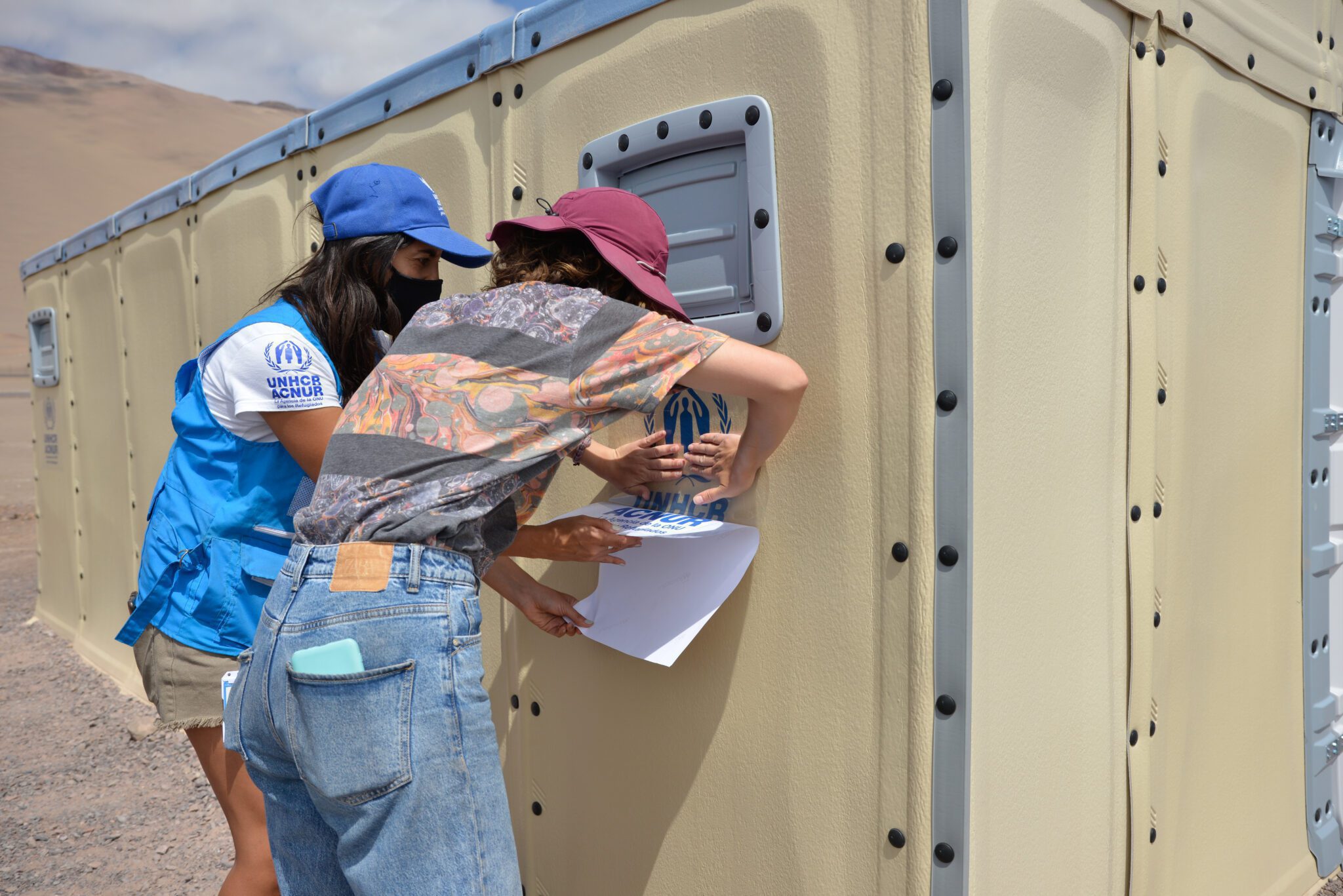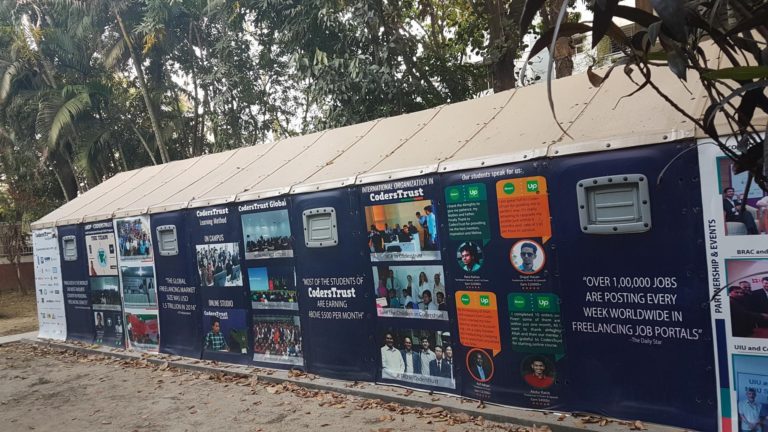Keeping communities safe with COVID-19 centres for refugees arriving in Chile

In early 2022, the northern Chilean border saw an influx of migrant arrivals, largely originating from Venezuela. Still at the height of the COVID-19 pandemic with closures and testing measures in place, the Presidential Delegation of Tarapacá and the Regional Ministerial Secretary of Health (SEREMI) implemented safety measures in order to keep both host and migrant communities safe.
In support of regional-level pandemic relief efforts, UNHCR donated 144 RHUs to Chile, implemented 25 kilometres from the city of Iquique. The objective of the implemented RHUs was to facilitate the mandatory quarantine for arriving migrants, under safe and sanitary conditions, also providing hygiene kits, masks and health services for those who were not yet integrated into the local health care system.
The initiative will be implemented by the Presidential Delegation of Tarapacá and the Regional Ministerial Secretary of Health (SEREMI) to facilitate that, daily, 240 refugees and migrants who have just entered through the northern border of the country can carry out a mandatory quarantine. UNHCR's support is part of the efforts that the agency is making at the regional level to complement the government response to Covid-19. Given the large increase in the arrival of refugees and migrants, most of them Venezuelans, through the northern border of Chile and the need for them to undergo a mandatory quarantine to comply with the health requirements of the Chilean authorities, UNHCR has recently supported the installation of a Temporary Sanitary Station 25 kilometers from the city of Iquique. This is an initiative led and implemented by the Regional Presidential Delegation of Tarapacá (DPRT) and the Regional Ministerial Secretariat of Health (SEREMI) on land donated by the Arturo Prat University. The primary objective of this initiative is to protect the community as a whole, given the rise in cases of Covid-19 and the great demand for the use of existing health residences. For this, UNHCR offered the donation and installation of 144 Modular Housing Units (UMR) -or RHUS for its acronym in English-, as well as the delivery of the equipment and furniture necessary for the proper functioning of the residence, however, the implementation and daily administration of the site will be under the jurisdiction of the Presidential Delegation and the SEREMI. “This place will have everything necessary so that refugees and migrants entering the country can comply with sanitary measures, in an effective and dignified way, to protect all the communities that live in the territory,” says Paulina Martínez, a member of the UNHCR Field Unit in the North Zone of Chile. To complement this, this humanitarian contribution is added to others that the Agency has carried out in northern Chile, such as the distribution of hygiene kits and masks to all communities, as well as the delivery of primary health care to refugees and migrants who are not yet integrated into the local health system.
The initiative will be implemented by the Presidential Delegation of Tarapacá and the Regional Ministerial Secretary of Health (SEREMI) to facilitate that, daily, 240 refugees and migrants who have just entered through the northern border of the country can carry out a mandatory quarantine. UNHCR's support is part of the efforts that the agency is making at the regional level to complement the government response to Covid-19. Given the large increase in the arrival of refugees and migrants, most of them Venezuelans, through the northern border of Chile and the need for them to undergo a mandatory quarantine to comply with the health requirements of the Chilean authorities, UNHCR has recently supported the installation of a Temporary Sanitary Station 25 kilometers from the city of Iquique. This is an initiative led and implemented by the Regional Presidential Delegation of Tarapacá (DPRT) and the Regional Ministerial Secretariat of Health (SEREMI) on land donated by the Arturo Prat University. The primary objective of this initiative is to protect the community as a whole, given the rise in cases of Covid-19 and the great demand for the use of existing health residences. For this, UNHCR offered the donation and installation of 144 Modular Housing Units (UMR) -or RHUS for its acronym in English-, as well as the delivery of the equipment and furniture necessary for the proper functioning of the residence, however, the implementation and daily administration of the site will be under the jurisdiction of the Presidential Delegation and the SEREMI. “This place will have everything necessary so that refugees and migrants entering the country can comply with sanitary measures, in an effective and dignified way, to protect all the communities that live in the territory,” says Paulina Martínez, a member of the UNHCR Field Unit in the North Zone of Chile. To complement this, this humanitarian contribution is added to others that the Agency has carried out in northern Chile, such as the distribution of hygiene kits and masks to all communities, as well as the delivery of primary health care to refugees and migrants who are not yet integrated into the local health system.
The initiative will be implemented by the Presidential Delegation of Tarapacá and the Regional Ministerial Secretary of Health (SEREMI) to facilitate that, daily, 240 refugees and migrants who have just entered through the northern border of the country can carry out a mandatory quarantine. UNHCR's support is part of the efforts that the agency is making at the regional level to complement the government response to Covid-19. Given the large increase in the arrival of refugees and migrants, most of them Venezuelans, through the northern border of Chile and the need for them to undergo a mandatory quarantine to comply with the health requirements of the Chilean authorities, UNHCR has recently supported the installation of a Temporary Sanitary Station 25 kilometers from the city of Iquique. This is an initiative led and implemented by the Regional Presidential Delegation of Tarapacá (DPRT) and the Regional Ministerial Secretariat of Health (SEREMI) on land donated by the Arturo Prat University. The primary objective of this initiative is to protect the community as a whole, given the rise in cases of Covid-19 and the great demand for the use of existing health residences. For this, UNHCR offered the donation and installation of 144 Modular Housing Units (UMR) -or RHUS for its acronym in English-, as well as the delivery of the equipment and furniture necessary for the proper functioning of the residence, however, the implementation and daily administration of the site will be under the jurisdiction of the Presidential Delegation and the SEREMI. “This place will have everything necessary so that refugees and migrants entering the country can comply with sanitary measures, in an effective and dignified way, to protect all the communities that live in the territory,” says Paulina Martínez, a member of the UNHCR Field Unit in the North Zone of Chile. To complement this, this humanitarian contribution is added to others that the Agency has carried out in northern Chile, such as the distribution of hygiene kits and masks to all communities, as well as the delivery of primary health care to refugees and migrants who are not yet integrated into the local health system.
The initiative will be implemented by the Presidential Delegation of Tarapacá and the Regional Ministerial Secretary of Health (SEREMI) to facilitate that, daily, 240 refugees and migrants who have just entered through the northern border of the country can carry out a mandatory quarantine. UNHCR's support is part of the efforts that the agency is making at the regional level to complement the government response to Covid-19. Given the large increase in the arrival of refugees and migrants, most of them Venezuelans, through the northern border of Chile and the need for them to undergo a mandatory quarantine to comply with the health requirements of the Chilean authorities, UNHCR has recently supported the installation of a Temporary Sanitary Station 25 kilometers from the city of Iquique. This is an initiative led and implemented by the Regional Presidential Delegation of Tarapacá (DPRT) and the Regional Ministerial Secretariat of Health (SEREMI) on land donated by the Arturo Prat University. The primary objective of this initiative is to protect the community as a whole, given the rise in cases of Covid-19 and the great demand for the use of existing health residences. For this, UNHCR offered the donation and installation of 144 Modular Housing Units (UMR) -or RHUS for its acronym in English-, as well as the delivery of the equipment and furniture necessary for the proper functioning of the residence, however, the implementation and daily administration of the site will be under the jurisdiction of the Presidential Delegation and the SEREMI. “This place will have everything necessary so that refugees and migrants entering the country can comply with sanitary measures, in an effective and dignified way, to protect all the communities that live in the territory,” says Paulina Martínez, a member of the UNHCR Field Unit in the North Zone of Chile. To complement this, this humanitarian contribution is added to others that the Agency has carried out in northern Chile, such as the distribution of hygiene kits and masks to all communities, as well as the delivery of primary health care to refugees and migrants who are not yet integrated into the local health system.
The initiative will be implemented by the Presidential Delegation of Tarapacá and the Regional Ministerial Secretary of Health (SEREMI) to facilitate that, daily, 240 refugees and migrants who have just entered through the northern border of the country can carry out a mandatory quarantine. UNHCR's support is part of the efforts that the agency is making at the regional level to complement the government response to Covid-19. Given the large increase in the arrival of refugees and migrants, most of them Venezuelans, through the northern border of Chile and the need for them to undergo a mandatory quarantine to comply with the health requirements of the Chilean authorities, UNHCR has recently supported the installation of a Temporary Sanitary Station 25 kilometers from the city of Iquique. This is an initiative led and implemented by the Regional Presidential Delegation of Tarapacá (DPRT) and the Regional Ministerial Secretariat of Health (SEREMI) on land donated by the Arturo Prat University. The primary objective of this initiative is to protect the community as a whole, given the rise in cases of Covid-19 and the great demand for the use of existing health residences. For this, UNHCR offered the donation and installation of 144 Modular Housing Units (UMR) -or RHUS for its acronym in English-, as well as the delivery of the equipment and furniture necessary for the proper functioning of the residence, however, the implementation and daily administration of the site will be under the jurisdiction of the Presidential Delegation and the SEREMI. “This place will have everything necessary so that refugees and migrants entering the country can comply with sanitary measures, in an effective and dignified way, to protect all the communities that live in the territory,” says Paulina Martínez, a member of the UNHCR Field Unit in the North Zone of Chile. To complement this, this humanitarian contribution is added to others that the Agency has carried out in northern Chile, such as the distribution of hygiene kits and masks to all communities, as well as the delivery of primary health care to refugees and migrants who are not yet integrated into the local health system.



